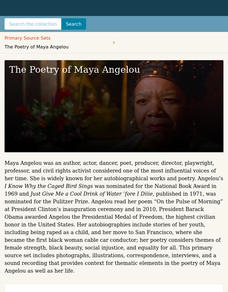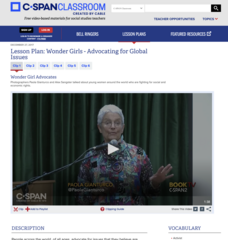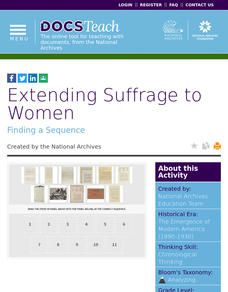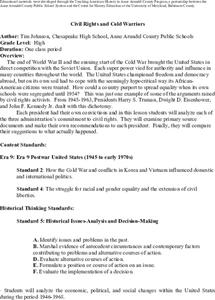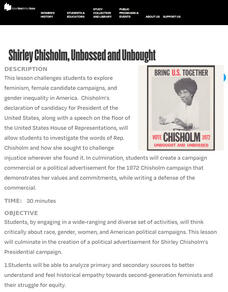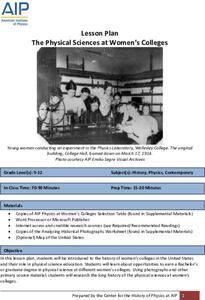Teaching Tolerance
The War on Drugs—Mechanisms and Effects
The war on drugs doesn't have definite results. An interesting lesson examines the social, political, and economic effect of the war on drugs. Academics learn how the war on drugs has led to mass incarcerations and negatively affected...
Teaching Tolerance
Understanding the Prison Label
Break the chain. An engaging lesson examines why it is so hard to break free of the prison system in the US. Academics participate in a reader's theater, read primary sources, and discuss their thoughts. The lesson explains the hardships...
US House of Representatives
“The Fifteenth Amendment in Flesh and Blood,” The Symbolic Generation of Black Americans in Congress, 1870–1887
The reading of a contextual essay launches a study of Black Americans who served in Congress from 1870 through 1887. Young historians identify the African Americans who served during this period, investigate the ways they won national...
US House of Representatives
A Picture is Worth a Thousand Words
Groups select a photograph from one of the four eras of African Americans in Congress and develop a five-minute presentation that provides background information about the image as well as its historical significance. The class compares...
Digital Public Library of America
The Poetry of Maya Angelou
Maya Angelou's work reflects her passion for life, civil rights, and justice for all. A collection of 12 primary sources provide scholars with insight into this amazing woman. The set includes photographs, articles, recordings of...
C-SPAN
Wonder Girls - Advocating for Global Issues
Move over Wonder Woman ... here come the Wonder Girls! Using video clips of photographer Paola Gianturco talking about her work, pupils consider the life experiences of girls around the world, including places such as Tonga and...
National Woman's History Museum
Breaking Through Gender Roles: The Women of NASA
Whether recognized or not, extraordinary women were integral to breaking gender barriers and putting Americans into space. For Women's History Month, explore a series of video clips and biographical information that profile these...
C-SPAN
Landmark Supreme Court Case: Roe v Wade
Perhaps no issue is as controversial than abortion in the American landscape. Go beyond the rhetoric by examining the Supreme Court case that legalized abortion in the United States. A guided note-taking activity unpacks the arguments...
Humane Education Advocates Reaching Teachers
Justice for All - Educating Youth for Social Responsibility: Grades 6-8
Teach middle schoolers how to develop healthy relationships with activities and lessons designed to create a kind and inclusive
classroom. Pupils create guidelines to develop a safe and civil learning environment. They learn how to...
DocsTeach
Extending Suffrage to Women
Votes for women! The activity highlights the push for the Nineteenth Amendment giving women the right to vote. High school scholars learn how the Fifteenth Amendment giving African American men the right to vote helped to spark the...
National Woman's History Museum
Women's Suffrage Movement
The National Women's History Museum offers a 20-slide presentation that details the history of the Women's Suffrage Movement from its creation in the 1830s through the passage of the Nineteenth Amendment in 1920.
Center for History Education
The Untold Story: The Black Struggle for Freedom during the Revolutionary War in Maryland
The American Revolution brought freedom to select groups and ignored others. An enlightening resource highlights the struggle of African Americans during the American Revolution and their efforts to escape slavery. Scholars analyze...
Center for History Education
Fighting for Whose Freedom? Black Soldiers in the American Revolution
Fight for freedom! The lesson delves into the world of African American soldiers during the American Revolution. Scholars read documents, such as the Dunmore Proclamation, to understand how the British government treated African...
Delaware Coalition Against Domestic Violence
Healthy Relationships
Teach tweens and teens how to prevent dating and domestic violence with a unit on healthy relationships. The unit begins with class members taking a relationships survey. As the unit progresses, class members engage in activities that...
DocsTeach
Suffrage Photograph Analysis
Votes for women! Young scholars use images to explore the suffrage movement and its impact on the United States. Historians work in groups or pairs to interpret the photograph, complete a worksheet, and discuss how their opinions of the...
Center for History Education
Civil Rights and Cold Warriors
Three presidents, three views on civil rights. Scholars compare the administrations of President Truman, Eisenhower, and Kennedy to understand how each addressed the issue of civil rights. The lesson uses primary sources and graphic...
DocsTeach
The Path of Justice: Selma and the Voting Rights Act
The civil rights movement: An ongoing battle for change. The activity focuses on President Johnson's speech in response to the massacre at the Selma March. Academics study the speech, complete a hands-on-activity, and discuss President...
Newseum
Compare Coverage of Brown v. Board Ruling
Young journalists analyze how The Topeka State Journal, the Jackson Daily News, and The Providence Journal reported on the 1954 Supreme Court decision in Brown v Board of Education. Scholars scrutinize the headlines, photographs,...
K20 LEARN
Oklahoma and Segregation
It was not just the states of the Deep South that practiced segregation. Young historians investigate the history of segregation and desegregation in Oklahoma. They begin by reading, annotating, and analyzing an article about the impacts...
National Woman's History Museum
Shirley Chisholm, Unbossed and Unbought
An engaging resource introduces young historians to Shirley Chisholm, the woman, the Black congresswoman, the activist, and the candidate for President in 1972. Class members study primary sources, watch a video of her announcing her run...
American Institute of Physics
The Physical Sciences at Women's Colleges
After a brief introduction to the history of women's colleges in the United States and a discussion of the resistance such institutions faced, young scientists investigate seven traditionally women's colleges and their physics programs....
Learning for Justice
Mary Church Terrell
Excerpts from an 1898 speech by civil rights activist Mary Church Terrell offers young scholars an opportunity to investigate how Black American women fought for civil rights long before Rosa Parks and the civil rights movement of the...
Learning for Justice
Mary McLeod Bethune
Young historians conduct a close reading of the text of an interview with Mary McLeod Bethune, the daughter of former slaves who taught herself to read, grew up to establish schools for other Black women, and went on to become an advisor...
Learning for Justice
Marian Wright Edelman
Marian Wright Edelman's 2014 Commencement Speech at Lewis and Clark College serves to inspire young scholars to investigate a problem in their community, to determine why the problem is important, and then to develop a plan for one thing...
Other popular searches
- Gender Equality
- Equality and Inequality
- Property of Equality
- Gender Equity
- Equality Tolerance
- Properties of Equality
- Equality Problems Fractions
- Racial Equality
- Equality & Diversity
- Gender Equality Activities
- Gender Equality in Math
- Athletic Equality






